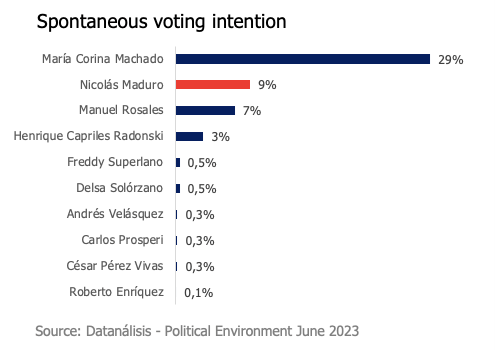





|
Tweet
|
|
|
The decision by Nicolás Maduro’s regime to replace the members of the National Electoral Council (CNE)—who still had five years left in their term—with individuals committed to keeping him in power highlights the regime’s awareness of its slim chances of winning a presidential election under democratic norms: free, fair, competitive, and verifiable. Public opinion studies suggest that nearly 90% of Venezuelans desire political change and a comprehensive transformation. This widespread sentiment stems from many hardships, including high inflation, extensive corruption, a severe economic crisis, rampant unemployment, and governance failures. This dire situation has prompted millions of Venezuelans to emigrate for better opportunities. The most pressing concerns for the population are their future and their children who have left the country. Numerous polls indicate that María Corina Machado, the leader of Vente Venezuela, represents the transformational change that most Venezuelans seek. She envisions a different form of governance, where citizens are responsible for their well-being rather than relying on a welfare state or social justice initiatives. To date, socialism has primarily served to benefit the political elites in Miraflores at the expense of the general populace. Meanwhile, Chavista-Madurist leadership has been draining the national treasury for the past two decades. María Corina Machado has successfully tapped into the widespread dissatisfaction with both the regime and the so-called functional opposition parties (AD, PJ, UNT). Her ideological stance, distinct from her competitors, has struck a chord with a diverse and increasingly attentive audience. Even though some political figures dismiss her ideas—like family reunification and oil-sector privatization—as irrelevant, a “silent majority” appears to be listening. According to the latest Datanálisis survey from June 2023, Machado’s support outpaces the total voting intention for other primary candidates by almost sixfold. When compared to Maduro, she leads by a staggering 300%. This surge in her popularity threatens Maduro’s grip on power and challenges the sideline role that the functional opposition has played for the last decade. To narrow this gap, Manuel Rosales is supporting Henrique Capriles’ campaign. The strategy is to transfer the bulk of the 500,000 votes Rosales received in the Zulia gubernatorial elections to Capriles, the Primero Justicia candidate. The hope is that Machado’s primary victory margin will be manageable to negate any questions about her leadership in the opposition. In this landscape, it is anticipated that various factions within the opposition will put forth their candidates, potentially enabling Maduro to retain power. It would impede the aspirations of most Venezuelans for transformative change, as the functional opposition and Madurist leadership carve up control over the country’s political offices. This emerging system risks legitimizing corrupt and criminal governance practices, while inviting foreign investment back into the country to share in the spoils. Nevertheless, most Venezuelans seek transformative change and have a leader capable of initiating it. The choice to remain subjugated by an expanding elite or to liberate ourselves by voting en masse in the primary and subsequent presidential election will be an individual decision. The latter option represents values of freedom and market-oriented principles many hold dear. |

